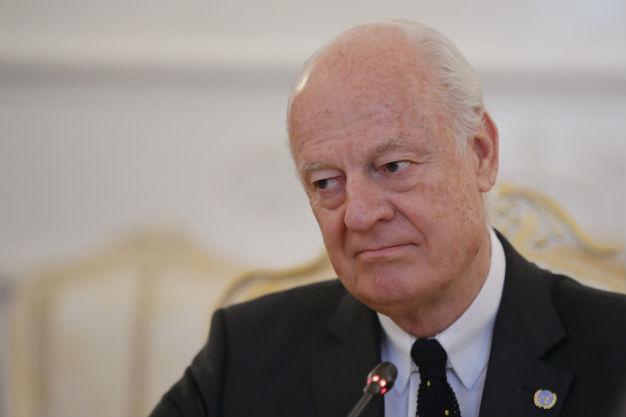400,000 more Syrians may rush to Turkey: UN
BERLIN

AA photo
The United Nations’ special envoy for Syria, Staffan de Mistura, made a plea on May 4 for a halt in fighting in the second city of Aleppo, warning that failure to do so could lead to a “catastrophic” outcome that could send 400,000 people rushing to the border with Turkey.“The alternative is truly quite catastrophic, because we could see 400,000 people moving toward the Turkish border,” de Mistura was quoted as saying by AFP after talks in Berlin with France and Germany’s foreign ministers on May 4.
De Mistura stressed that a return to peace talks hinged on a cease-fire.
“The test is Aleppo now,” he said.
The Berlin talks, which also included Syria’s main opposition leader, Riad Hijab, is part of a week of whirlwind diplomacy as negotiators battle to salvage a collapsing truce, especially in Aleppo, where fierce fighting for two weeks have killed around 289 civilians on both sides of the fight.
A 48-hour cease-fire took hold May 5 in Aleppo after Syrian President Bashar al-Assad’s regime and rebel forces gave in to mounting diplomatic pressure.
The Syrian army said late May 4 that it had agreed to calls from Russia and the United States for a two-day truce in Aleppo that would begin from 1 a.m. on May 5.
The agreement followed an intense diplomatic push by Moscow and Washington – the co-sponsors of a Feb. 27 cease-fire agreement that had begun to fall apart – to salvage peace efforts.
Relieved residents returned to the streets after two weeks of heavy fighting in the divided metropolis, a key battleground in Syria’s five-year civil war.
Early on May 5, an AFP correspondent in the city said there had been no signs of fresh air raids since the cease-fire took effect.
The Syrian Observatory for Human Rights, a monitoring group, confirmed there had been no bombing in the city, though it said a civilian had died in a western district from rebel shelling that came minutes after the cease-fire took effect.
After a whirlwind of talks involving diplomats from top world powers and the U.N., U.S. Secretary of State John Kerry announced the truce had taken effect and that violence had already fallen off.
“We’ve seen an overall decrease in violence in those areas even though there are some reports of continued fighting in some locations,” Kerry said.
The Russian Defense Ministry said its cease-fire monitors had agreed with their U.S. counterparts to oversee this truce until midnight on May 6.
In Aleppo, the head of the local branch of the powerful Jaish al-Islam (Army of Islam) rebel force, Ahmad Sanada, said the group would respect the cease-fire.
“We are in favor of any initiative that relieves the suffering of civilians and avoids bloodshed and we will respect” the cease-fire, he told AFP.
Though calm mostly prevailed in Aleppo, a double bomb attack on May 5 in central Syria killed at least 10 civilians and wounded 40 others, according to the Observatory.
State television reported that at least six people were killed and 28 seriously wounded in the suicide attack and car bombing in a square in Mukharram al-Fawqani in Homs province.
The area, controlled by the government, is located between the cities of Homs and Palmyra, which was recaptured by the Syrian army from jihadists last month.
The blasts come just after the Islamic State of Iraq and the Levant (ISIL) group seized the nearby Shaer gas field, one of the biggest in Homs, in an attack that killed at least 16 government troops.
The Syrian government controls most of Homs, the country’s largest province, except for certain areas held by rebels or ISIL.
Meanwhile, Iraqi army forces recaptured five areas in the western city of Fallujah from ISIL, a top Iraqi official told state-run Anadolu Agency.
“Iraqi forces and tribal fighters have liberated five areas [in Fallujah] from Daesh and imposed their control over them,” Anbar Operations Commander Major-General Ismail Mahlawi said, using an Arabic acronym for ISIL.
















